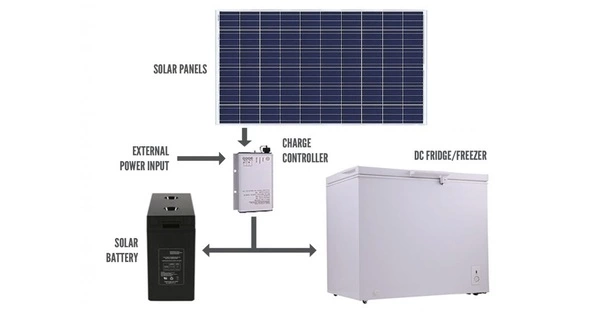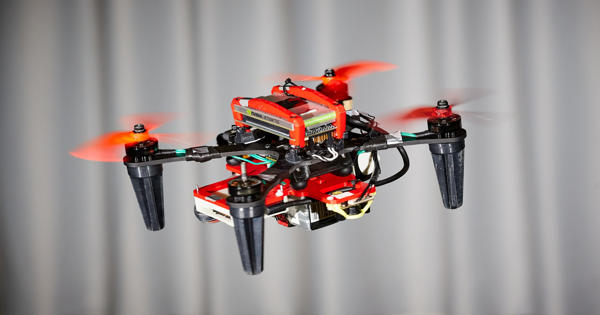A solar-powered refrigerator is one that runs on energy directly supplied by the sun, which may include photovoltaic or solar thermal energy. It is a type of refrigerator that uses solar energy to generate electricity. It is intended to be a more energy-efficient and environmentally friendly alternative to traditional refrigerators that use grid electricity, which is frequently generated from non-renewable sources such as coal or natural gas.
Solar-powered refrigerators can keep perishable goods like meat and dairy cool in hot climates and are used to keep vaccines at the proper temperature to prevent spoilage. These are typically used in off-grid locations where utility-provided alternating current (AC) power is unavailable.
Technology
Solar refrigerators are distinguished by thick insulation and the use of a DC (rather than an AC) compressor. Solar-powered refrigerators and vaccine coolers have traditionally used a combination of solar panels and lead batteries to store energy for cloudy days and at night when there is no sunlight to keep their contents cool. These refrigerators are expensive and require heavy lead-acid batteries, which deteriorate over time, especially in hot climates, or are misapplied.
Furthermore, the batteries must be maintained, replaced every three years, and disposed of as hazardous wastes, potentially resulting in lead pollution. These issues, as well as the resulting higher costs, have hampered the use of solar-powered refrigerators in developing countries.
The key components of a solar-powered refrigerator include:
- Photovoltaic (PV) Panels: These panels are responsible for converting sunlight into electrical energy. They consist of semiconductor materials that produce a direct current (DC) when exposed to sunlight.
- Charge Controller: The charge controller regulates the flow of electricity from the solar panels to the refrigerator’s batteries. It prevents overcharging and ensures the batteries are charged efficiently.
- Batteries: Energy generated by solar panels is stored in batteries, which act as a reservoir of electricity. The stored energy can be used during periods when there is limited or no sunlight.
- Inverter: The inverter converts the direct current (DC) from the batteries into alternating current (AC), which is the type of electricity required to power conventional refrigerators.
- Compressor and Cooling System: The compressor is responsible for cooling the refrigerator by compressing and expanding refrigerant gases. This process removes heat from the interior of the refrigerator, keeping the contents cool.
Use
Individuals who live off-the-grid frequently use solar refrigerators and other solar appliances. They provide a way to keep food safe and preserved without relying on utility-provided power. Solar refrigerators are also used as an alternative to absorption refrigerators in cottages and camps because they can be left running all year. Other applications include keeping medical supplies at proper temperatures in remote locations and temporarily storing game at hunting camps.
Advantages of solar-powered refrigerators:
- Renewable Energy Source: Solar energy is abundant and renewable, reducing dependence on fossil fuels and lowering greenhouse gas emissions.
- Off-Grid Capability: Solar-powered refrigerators can operate independently of the electricity grid, making them suitable for remote areas or regions with unreliable electricity supply.
- Reduced Electricity Bills: By utilizing solar energy, users can save on electricity costs in the long run.
- Environmentally Friendly: Solar-powered refrigerators have a smaller carbon footprint compared to traditional refrigerators that rely on fossil-fuel-based electricity.
- Quiet and Low Maintenance: Solar-powered refrigerators typically have fewer moving parts and are quieter than conventional refrigerators. They also require less maintenance.
















